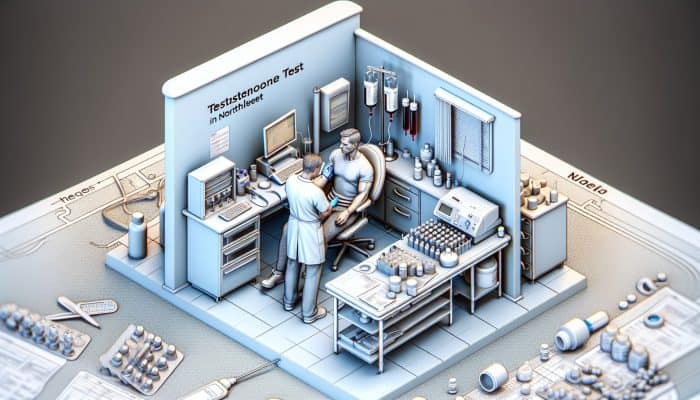Unlocking the Importance of Conducting a Testosterone Blood Test
What You Need to Know About the Testosterone Blood Test

A testosterone blood test in Northfleet is a vital medical procedure designed to evaluate the levels of testosterone, a crucial hormone that plays a significant role in various biological functions. This hormone is essential for the development of muscle mass, the maintenance of bone density, and the regulation of libido among other physiological processes. By accurately measuring testosterone levels, healthcare providers can diagnose conditions associated with hormonal imbalances, making this test an essential element in assessing and improving male health and overall quality of life.
Understanding the nuances of this test is critical, as it allows healthcare professionals to identify not only low testosterone levels but also elevated levels that may indicate serious health issues. High testosterone can be a sign of various disorders, and comprehending these hormonal dynamics is essential for developing effective treatment plans tailored to individual health profiles and needs.
Exploring the Key Objectives of the Testosterone Blood Test
The primary aim of a testosterone blood test in Northfleet is to evaluate and assess hormonal health. This assessment is particularly effective in diagnosing conditions like hypogonadism, which occurs when the body does not produce sufficient testosterone. Symptoms of this condition can include reduced libido, persistent fatigue, and decreased bone density, all of which can severely affect an individual's quality of life.
In addition, this test is crucial for investigating issues related to infertility and specific sexual dysfunctions. Men who notice a decline in their energy levels or experience significant mood changes may find that their testosterone levels are a contributing factor. Understanding these levels empowers men to consider targeted treatment options, which can range from lifestyle changes and hormone replacement therapy to further exploration of other underlying health issues.
Step-by-Step Guide to the Testosterone Blood Test Procedure
Undergoing a testosterone blood test in Northfleet is generally a simple and hassle-free process. The procedure typically begins with a qualified healthcare professional drawing a blood sample from a vein in the arm. This process takes place in a clinical environment, ensuring that it is sterile and safe, which is vital for obtaining accurate test results.
Once the blood sample is collected, it is sent to a laboratory for meticulous analysis. The testing process is swift and employs various methods to quantify testosterone levels, including assessments of both total testosterone and free testosterone. Understanding which specific test aligns with your health evaluation is essential, and healthcare providers will usually guide you based on your individual health context and needs.
Crucial Preparations to Ensure Accurate Test Results

Proper preparation is key to achieving reliable outcomes from a testosterone blood test in Northfleet. Patients are typically advised to refrain from eating or drinking anything other than water for a specified duration prior to the test. Adhering to these guidelines is crucial, as it ensures that the results reflect true hormone levels, unaltered by any recent dietary intake.
Moreover, factors such as stress, illness, or even recent physical exertion can skew results, highlighting the importance of following preparatory instructions meticulously. Being thoroughly prepared not only establishes a trustworthy baseline for your testosterone levels but also assists in accurately identifying potential health issues that may require intervention and monitoring.
Effectively Interpreting Your Test Results
Interpreting the results from a testosterone blood test in Northfleet requires a clear understanding of the normal hormonal ranges, which can vary considerably based on age and sex. Healthcare professionals will compare the obtained values against established reference ranges to accurately evaluate your hormonal health.
Abnormal testosterone levels, whether elevated or diminished, often necessitate further investigation. Low testosterone levels may indicate underlying health disorders requiring treatment, while high levels could necessitate additional testing to exclude serious conditions. Having an informed discussion with your healthcare provider following the test is crucial to understanding what these results mean for your health and to explore potential treatment options available to you.
Why Northfleet is the Ideal Choice for Your Testosterone Testing Needs
Local Healthcare Expertise You Can Trust

Choosing Northfleet for your testosterone blood test means you will benefit from a wealth of local expertise. Healthcare professionals in this area not only possess the technical skills necessary to carry out the test but also have a profound understanding of how to interpret the results comprehensively. Their familiarity with common health issues within the community enables them to provide pertinent advice and personalised treatment plans that resonate well with the local population.
Additionally, many practitioners in Northfleet specialise in men's health, fostering a comprehensive understanding that can significantly enhance the patient experience. This dedication to men’s health creates an environment where individuals feel comfortable discussing sensitive topics related to testosterone levels and overall health, ensuring a holistic approach to healthcare delivery.
Convenient Access to Testing Facilities
Convenience is paramount when it comes to healthcare, and Northfleet is home to a variety of clinics and laboratories that provide easy access to testosterone blood tests. With numerous facilities located throughout the area, residents can easily find a nearby clinic, thereby removing the barriers that often prevent individuals from seeking essential health assessments.
These local clinics often utilise advanced technology and employ highly trained staff, ensuring that patients receive timely and high-quality services. The ease of access also allows for quicker appointment scheduling, minimising disruptions to daily routines, making it much simpler for individuals to prioritise their health without the need for lengthy travel or extended waiting periods.
Affordable Testing Solutions Available in Northfleet
Opting for Northfleet for your testosterone blood test can be a financially savvy choice. The costs associated with testing in this region are often more competitive compared to larger urban centres, making it an appealing option for those who are conscious of healthcare expenses.
Moreover, many clinics in Northfleet are likely to accept a variety of health insurance plans, potentially further lowering out-of-pocket costs. Understanding these financial dynamics can assuage worries regarding the affordability of necessary health evaluations, thus making proactive health management more achievable for local residents.
Preparing for Your Testosterone Blood Test: Key Steps to Follow
A Comprehensive Guide to Fasting Requirements
Preparing for a testosterone blood test in Northfleet often involves following specific fasting guidelines. Healthcare providers may recommend that patients refrain from consuming food or beverages, aside from water, for a certain period before the test. This fasting protocol is essential for ensuring that the results are precise and unaffected by recent dietary habits.
Typically, the fasting period ranges from 8 to 12 hours, depending on the specific instructions your healthcare provider gives you. Adhering to these guidelines is crucial as it helps establish a clearer representation of your testosterone levels, ultimately leading to more accurate diagnoses and informed treatment recommendations.
Medication Guidelines to Consider Before Testing
When preparing for a testosterone blood test in Northfleet, it is vital to inform your healthcare provider about any medications you are currently taking. Certain pharmaceuticals can significantly affect testosterone levels, and your doctor may suggest temporarily discontinuing specific medications prior to testing to prevent skewed results.
For example, medications related to hormone therapy, anabolic steroids, or even certain antidepressants may disrupt hormonal balances. Open and honest communication about your medication history allows your healthcare provider to effectively guide you through the preparation process, ensuring that your test results accurately reflect your health status and potential treatment needs.
Optimal Timing for Testosterone Testing
The timing of your testosterone blood test in Northfleet can be crucial for ensuring accuracy. Testosterone levels naturally fluctuate throughout the day, with peak levels typically occurring in the early morning. Consequently, healthcare providers frequently recommend scheduling the test for early in the day to obtain the most reliable results.
Aligning the timing of the test with these natural hormonal rhythms increases the likelihood of obtaining an accurate measurement of your testosterone levels. This understanding aids healthcare professionals in making informed decisions regarding diagnosis and potential treatment options tailored to your individual hormonal profile.
Managing Lifestyle Factors Prior to the Test
Several lifestyle factors can markedly affect the results of a testosterone blood test in Northfleet. Activities such as engaging in intense exercise, consuming alcohol, or experiencing elevated stress levels immediately before the test can alter testosterone readings. Therefore, it is advisable to avoid strenuous physical activity and limit alcohol consumption in the days leading up to the test.
In addition, ensuring that you have adequate rest and effectively managing stress levels can contribute to more stable hormone levels, thereby promoting a more accurate assessment. These adjustments not only enhance the reliability of your test results but also support better overall health and well-being in the long run.
What to Expect During Your Testosterone Blood Test
A Clear Explanation of the Blood Testing Procedure
Undergoing a testosterone blood test in Northfleet is generally a quick and straightforward experience. The blood draw is conducted by a trained phlebotomist who will prepare the site, typically the arm, for the collection process. This procedure is swift, usually taking no more than a few minutes from start to finish, ensuring minimal disruption to your day.
Patients often report experiencing only mild discomfort associated with the blood draw, which can feel akin to a slight pinch. Understanding that this process is rapid and uncomplicated can help alleviate any apprehensions surrounding the test, allowing individuals to approach the experience with greater confidence and ease.
Dealing with Potential Discomfort During the Test
While the thought of a testosterone blood test in Northfleet may induce some anxiety, it is important to recognise that any potential discomfort is typically minor and short-lived. Patients may feel a slight sting when the needle penetrates the skin, followed by a sensation of pressure as blood is drawn.
For most individuals, this discomfort subsides almost immediately after the needle is removed. Being aware of what to expect can help reduce anxiety, allowing patients to focus on the importance of the test rather than the temporary sensations associated with the blood draw.
Post-Test Activities and Considerations for Recovery
Once your blood sample has been collected during the testosterone blood test in Northfleet, you are free to resume your normal activities without delay. Generally, there are no significant restrictions or recovery protocols following the test, making it a convenient component of your healthcare routine.
The collected sample will be sent to a laboratory for comprehensive analysis, where it will undergo a rigorous examination to accurately measure testosterone levels. Understanding that this procedure is straightforward can help ease any nerves, enabling you to concentrate on the next steps in your healthcare journey with clarity and purpose.
Understanding Your Results Timeline
After completing a testosterone blood test in Northfleet, patients typically receive their results within a few days to a week, depending on the laboratory’s processing capabilities. This relatively quick turnaround allows for timely discussions with healthcare providers regarding the interpretation of results and the necessary actions that may follow if required.
Receiving results in a prompt manner can provide reassurance, enabling individuals to swiftly address any concerns regarding their hormonal health. It also establishes a clear pathway for potential subsequent steps, whether that involves treatment strategies, retesting, or lifestyle adjustments based on the findings.
Deciphering Your Test Results
Understanding Normal Testosterone Levels
Grasping the definition of normal testosterone levels is essential when interpreting results from a testosterone blood test in Northfleet. These normal ranges can vary significantly based on factors such as age, sex, and individual health circumstances. Typically, laboratories provide reference ranges that enable healthcare providers to ascertain whether your testosterone levels fall within a healthy range.
For men, the normal total testosterone levels generally range from approximately 300 to 1,000 ng/dL (nanograms per decilitre), though some variability can occur. Understanding where your levels sit within these ranges can provide valuable insights into your hormonal health and facilitate discussions regarding potential lifestyle changes or medical interventions that may be necessary.
Implications of Low Testosterone Levels
When your testosterone blood test in Northfleet reveals low levels, it may suggest conditions such as hypogonadism or other hormonal imbalances. Low testosterone can manifest in various symptoms, including chronic fatigue, mood disorders, decreased sexual desire, and in severe cases, osteoporosis.
If results indicate low testosterone, your healthcare provider will typically discuss potential treatment pathways, which may involve hormone replacement therapy, lifestyle adjustments, or further diagnostic evaluations to uncover underlying causes. Understanding the implications of low testosterone levels is crucial for paving the way for effective management and enhancing overall quality of life.
Understanding the Consequences of High Testosterone Levels
Conversely, elevated testosterone levels identified during a testosterone blood test in Northfleet can signal various health issues, including hormonal disorders or the use of anabolic steroids. High testosterone levels can lead to symptoms such as increased aggression, mood swings, and potential health complications that may arise if left unaddressed.
If your results reveal elevated testosterone levels, your healthcare provider will likely recommend further investigation to determine the underlying cause and may propose suitable interventions to manage the situation effectively. This proactive approach is essential for ensuring that any health risks associated with high testosterone levels are promptly addressed, safeguarding your overall well-being.
Factors That Influence Testosterone Levels
Numerous lifestyle and environmental factors can significantly impact the results of a testosterone blood test in Northfleet. Elements such as diet, physical activity levels, sleep quality, and stress management are critical in maintaining balanced testosterone levels.
For instance, a diet rich in healthy fats, adequate protein, and essential vitamins can support hormone production, while regular exercise can help regulate levels through enhanced metabolic function. Being aware of these influences allows individuals to implement positive lifestyle changes that may improve their hormonal health overall, contributing to a better quality of life.
When to Consider Retesting Testosterone Levels
Following the initial results of your testosterone blood test in Northfleet, your healthcare provider may recommend retesting based on the findings and any treatments initiated. Regular monitoring of testosterone levels is crucial for evaluating the effectiveness of therapies or lifestyle modifications undertaken.
Retesting also serves as a mechanism for identifying changes in hormonal health over time, offering a clearer picture of your overall well-being and enabling timely adjustments to treatment plans as necessary. Remaining engaged with your healthcare provider after your test results is vital for optimising your health journey and ensuring you receive continuous support.
Next Steps Following Your Testosterone Test
Engaging in a Follow-Up Discussion with Your Doctor
Scheduling a follow-up appointment to discuss the results of your testosterone blood test in Northfleet is a crucial step in your healthcare process. This consultation provides an opportunity for an in-depth discussion about what your results indicate, potential underlying health issues, and necessary actions moving forward.
Healthcare providers can offer insights tailored to your unique situation, addressing concerns, answering questions, and clarifying any uncertainties regarding your hormonal health. Engaging in this dialogue fosters a collaborative approach to care, ensuring that you are well-informed and actively involved in any required treatment plans.
Exploring Various Treatment Options Available
Depending on the outcomes of your testosterone blood test in Northfleet, a range of treatment options may be discussed. If low testosterone levels are identified, hormone replacement therapy may be a viable pathway, offering substantial benefits in terms of improved energy levels, mood stability, and overall enhancement of quality of life.
Conversely, if high levels are recorded, the focus may shift towards addressing the underlying causes, which could involve lifestyle adjustments or medication modifications. Understanding these potential treatment avenues empowers individuals to take control of their health and work closely with healthcare providers to identify the best solutions tailored to their unique needs and circumstances.
Monitoring Your Progress After Treatment
Regular follow-up tests may be essential for tracking testosterone levels after treatment has commenced. Understanding how your levels respond to various interventions is crucial for effective management of your hormonal health. These follow-up tests provide valuable insights into the effectiveness of any treatment, facilitating timely adjustments as needed.
Engaging in this ongoing monitoring process not only optimises your hormonal health but also contributes positively to your overall well-being. By maintaining an active role in your healthcare, you can ensure that you receive the necessary support and guidance required for continued success in achieving your health objectives.
Frequently Asked Questions About Testosterone Testing
What does a testosterone blood test involve?
A testosterone blood test measures the concentration of testosterone in your blood, helping to diagnose conditions related to hormonal imbalances, such as hypogonadism or infertility issues.
How should I prepare for a testosterone blood test?
Preparation may include fasting for several hours beforehand, avoiding certain medications, and discussing lifestyle factors that could impact hormone levels with your healthcare provider.
What can I expect during the blood draw process?
The blood draw is typically quick and performed by a trained professional, with minimal discomfort usually experienced by patients during the process.
How long will it take to receive the results of my test?
Results are generally available within a few days to a week after the blood sample has been processed by the laboratory, allowing for timely follow-up.
What do low testosterone levels indicate about my health?
Low testosterone levels may suggest conditions such as hypogonadism and can lead to symptoms including fatigue, reduced libido, and mood disorders that may require intervention.
Can lifestyle changes impact testosterone levels?
Yes, factors such as diet, exercise, sleep quality, and effective stress management can significantly influence testosterone levels and overall hormonal health.
When should I consider retesting my testosterone levels?
Your healthcare provider may recommend retesting testosterone levels following treatment or to monitor changes in hormonal health over time for effective management.
What treatment options are available for low testosterone levels?
Treatments may include hormone replacement therapy, lifestyle modifications, or addressing underlying health issues contributing to low testosterone levels.
Are there risks associated with elevated testosterone levels?
Yes, high testosterone levels can lead to health complications and may necessitate further investigation to ascertain the underlying cause and associated risks.
Why is it essential to discuss test results with my doctor?
Engaging in a discussion about your results with your doctor ensures you understand the implications for your health and can collaboratively develop an appropriate treatment plan tailored to your individual needs.



What a comprehensive overview of the testosterone blood test! It really highlights how crucial this simple yet powerful tool is in the realm of men’s health. Personally, I think it’s fascinating how a single hormone can influence so many aspects of our physiology and overall well-being—from muscle mass and energy levels to mood and libido. It’s like testosterone is the unsung hero of our body’s inner workings, quietly shaping our health without much fanfare.